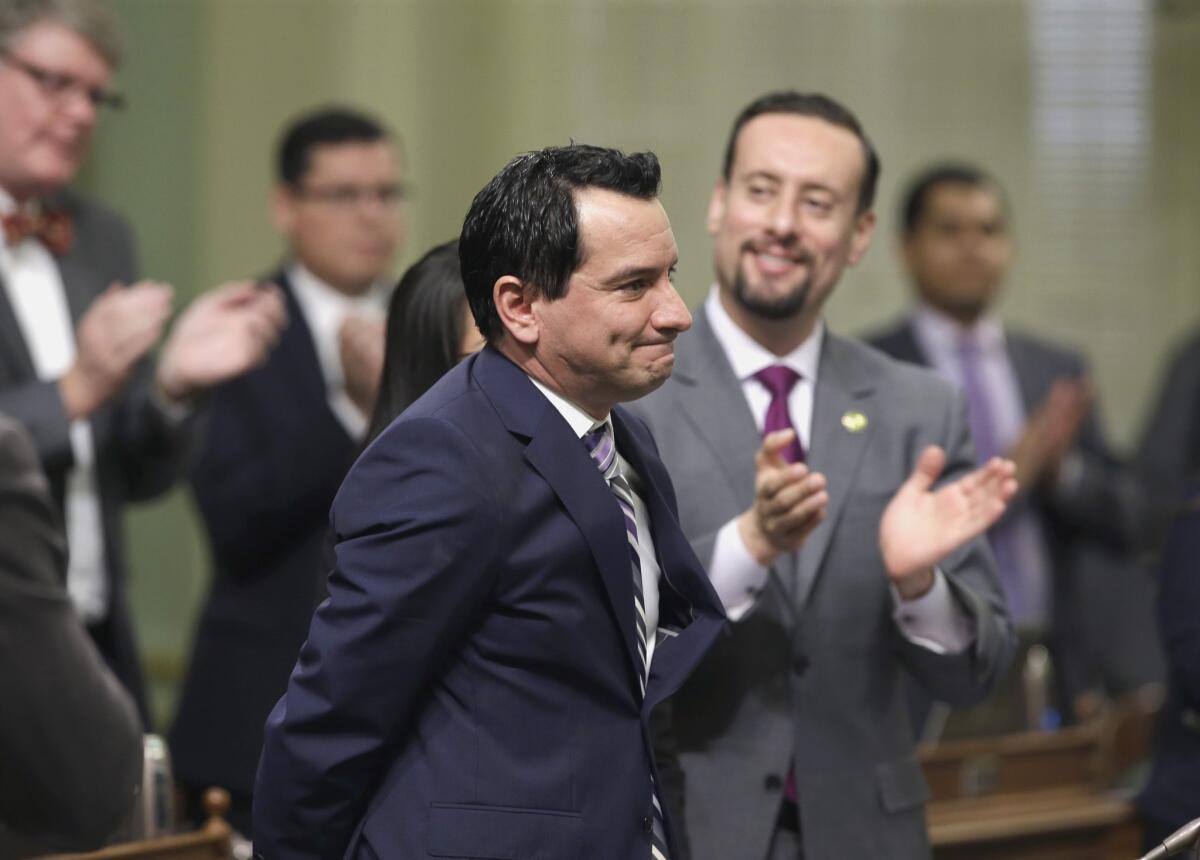Editorial: California lawmakers have some very big ‘to dos’ on their lists this year

Assemblyman Anthony Rendon of Lakewood receives a standing ovation after his election as the next Assembly speaker in Sacramento on Jan. 11.
Despite historically high capital gains revenue, the $171-billion budget proposal outlined by Gov. Jerry Brown last week reflects his frugal sensibilities. While it doles out a bit of extra money to public education, health care and other programs that had been slashed during the recession, appeasing at least some of those who advocated for more spending, it avoids any major new initiatives.
Even Republican legislators for the most part said they were happy with the governor’s spending restraint, though many still found something in the plan to grumble about. One reason for their support was that Brown wants to squirrel away even more money in the rainy day fund than state law requires. He explained why during a budget news conference, pulling out an ominous chart titled “More Dedicated Spending, Combined With Recession, Would Be Devastating,” covered with deep slashes of red ink.
[Governor Jerry Brown] has been legitimately criticized by members of his own party for ... refusing to make whole the safety-net programs that had been cut deeply.
Point taken. Fiscal prudence continues to be Brown’s modus operandi, and the state has benefited from it. Still, he has been legitimately criticized by members of his own party for doggedly underestimating state revenue and refusing to make whole the safety-net programs that had been cut deeply. Although Brown’s new budget is a solid start, there ought to be room to reverse more of the penny-wise, pound-foolish cuts made to programs such as those that aid the developmentally disabled and help poor Californians move from welfare to work.
State senators and Assembly members also got back to work last week after a long break. It’s the second half of a two-year session, so bills that got sidelined last year can be dusted off and debated again. There will be hundreds of new bills as well. Although some will be absolutely necessary to respond to new events (such as the natural gas leak in Porter Ranch), we urge as always that legislators be more focused on the big picture and less reactive with legislation.
We particularly hope that the rest of the session won’t resemble the first few days, which saw a flurry of seemingly random bills, including proposals to waive the sales tax on tampons and lift the restriction on selfies in the ballot box. Not to say these are bad bills (or good ones), just that they don’t seem to help solve the larger and more pressing problems of the state’s volatile tax receipts and its low voter turnout.
A plan of action is going to be necessary this year because legislators have some very big “to dos” on their lists. Keeping their members on track and limiting bills that aim just to generate headlines will be the responsibility of Senate President Pro Tem Kevin de León (D-Los Angeles) and Assembly Speaker-elect Anthony Rendon (D-Lakewood) as well as the two new Republican legislative leaders, Sen. Jean Fuller (R-Bakersfield) and Assemblyman Chad Mayes (R-Yucca Valley).
As leaders elected under the looser term limits Proposition 28 granted in 2012, Rendon and Mayes have the added responsibility of fulfilling the promise to voters that longer terms in office (a maximum of 12 years in a single chamber, up from six) would result in a longer view on legislation that would focus on solving bigger state problems and result in fewer self-serving bills.
The biggest questions facing legislators this year have to do with money. To start, they must resolve the two still-open special sessions on Medi-Cal and transportation funding. The governor has come up with a proposal to replace the $1 billion lost from the expiration of the tax on Medi-Cal managed care organizations, but there are still big open questions about how the state will pay to fix its roads.
This year too legislators must start planning for the looming expiration of the temporary increases in sales and income taxes that voters approved in 2012’s Proposition 30. A number of proposals have been floated, including imposing a sales tax on services and making Proposition 30’s tax hikes permanent. Whether it is raising revenue or ramping down spending, they must settle on a plan and then put it into action.
Legislators also should take the time to fix the school district reserve cap, a provision of the state’s rainy day fund that perversely restricts districts from saving money during surplus years to help during downturns. And lawmakers can limit the chaos on the November ballot by holding hearings on citizen initiatives, which threaten to befuddle voters with a long list of complex proposals to raise or lower taxes, lift California’s prohibitions on marijuana and make other significant changes in state law. They should do so as soon as possible, with an eye on striking deals that present voters with a manageable number of issues and clear choices.
Follow the Opinion section on Twitter @latimesopinion and Facebook
More to Read
A cure for the common opinion
Get thought-provoking perspectives with our weekly newsletter.
You may occasionally receive promotional content from the Los Angeles Times.






